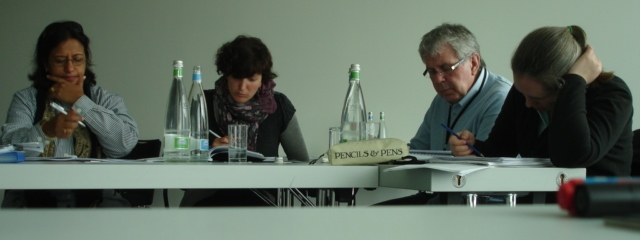IT and workshops
Friday 15 April 2011
I’ve been running IB workshops for many years – the first was in the 1980s and I have seen a lot of changes. Like all changes there are usually advantages and disadvantages. Until recently in Europe and in Latin America (the old IBLA region) workshop venues were always schools. In North America they have always favoured so called professional venues which usually means hotels. Apart for the fact that this could imply that a school is not a professional place of work (!) there are real advantages and disadvantages for both types of venue. I once spent four hours on a bus going round the Paris périférique being transported from a hotel to a school so I do appreciate that in hotel venues there is no travelling. On the other hand there is no access to laboratories in a hotel which does make including hands-on practical work in Chemistry either impossible or at the very least rather superficial. For the past three years or so ‘professional’ venues have become standard across all of the IB regions. I even did a workshop in Disneyland, Paris shortly after IBAEM switched over! Of course, the best solution of all would be to hold them in hotels but organise it so that a couple of sessions could be spent in a local IB school. On balance, however, the switch to hotels is probably a good thing. InThinking has always held its workshops in hotels and one other advantage is that InThinking sessions finish early enough for the participants to enjoy Paris, Berlin, London, Madrid or Barcelona as the hotels are always very central.

A marking session during a recent Chemistry workshop in Zurich in the Radisson Airport Hotel
One other recent change though is not so good. IT is generally an excellent tool. In Europe we insist that the workshop leader has Internet access throughout the whole workshop. Often this also means that all participants can be on line throughout the workshop too. This is essential to deliver a modern workshop that meets the needs of the syllabus and it amazes me that this is not something that is routinely provided in the IBNA region. After the first day I like to talk to my participants and ask them if they are happy with the way the workshop is running as it means that if there is a problem, for example, if their level of English is preventing good communication, then there is time to address it during the workshop. Until the IB Global Architecture for Professional Development in workshops was launched in 2009 it was normal to give all participants an evaluation form to complete and hand in at the end of the workshop. This meant that the workshop leader got instant feedback when the workshop was fresh in his or her mind and that we got 100% return from all the participants. Now the evaluation is ‘done’ electronically. Participants receive an e-mail with a form to complete a few days after the workshop has finished. Even after more than two years of this system it still does not work. I am lucky if I get responses from about half of my participants and after collating by the IB the feedback arrives anywhere from between six weeks and three months after the workshop has ended and so is virtually useless. We have gone from a 100% instant return to about a 50% return many weeks later – this is not progress. For this reason at InThinking workshops we still ask all participants to fill in an evaluation form during the last session of the workshop – it may be using the old-fashioned technology of a pen and a piece of paper but in this instance it is far superior to the fallible IT alternative.

